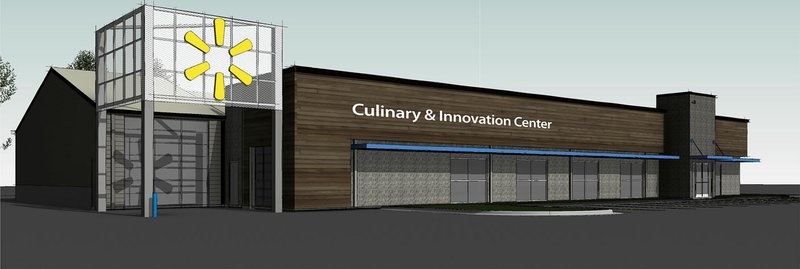Wal-Mart Stores Inc. always has placed a priority on having the right products on the shelves at the right time and at the right price.
"I guess real merchants are like real fishermen: We have a special place in our memories for a few of the big ones," company founder Sam Walton wrote in his book, "Made in America."
Culinary & Innovation Center
The Culinary & Innovation Center located at Walmart’s Home Office will enable the Walmart U.S. business to test quality and think about the next great food, beverage, consumable and over-the-counter items for its customers. Walmart will use the space to both test its private brand items and work alongside national brand suppliers. Sam’s Club operates a food sensory lab as well.
The facility is approximately 12,000 square feet and includes:
• 10 kitchens, including a theater style chef’s kitchen and replicas of the bakery and deli kitchens found in most of our stores
• Adult beverage testing lab and consumables testing lab
• Double-sided sensory testing lab that can accommodate twelve individual customer taste tests at a time
• Meeting space, laundry and dishwashing areas
Source: Wal-Mart Stores Inc.
Company leaders hope the new Culinary & Innovation Center at the Bentonville headquarters helps them find more big products.
Steve Bratspies, Walmart U.S. chief merchandising officer, said during a March investors' conference that the company was building a "best-in-class product development and sensory lab" that will "give us a whole new level of capability for us to build as we go forward."
Walmart recently completed construction on the 12,000-square-foot center, which includes 10 kitchens, adult beverage and consumables testing labs and a double sided sensory testing lab with places for 12 testers. The facility also has meeting space and laundry and dishwashing areas.
"As we think about being great merchants and making sure all the products we make are high quality and the right assortment, we decided we needed to up our game," said Jack Pestello, Walmart U.S. senior vice president of private brands.
Pestello is in charge of the lab, which tests products from Walmart's store brands and other suppliers. He said the facility will be used to bake and test many types of products. The company is testing food, beverage, consumable and over-the-counter medication.
"It helps us make sure as we develop products, we are responding to what customers want," he said.
This is not the first time Walmart has been able to test products. The retailer has kitchens scattered across the home office where between 65 and 100 people test more than 1,000 products.
Pestello said the lab will help get higher quality products to customers faster.
Carol Spieckerman, a retail expert and CEO of Spieckerman Retail in Bentonville, said she believes this facility shows Walmart's determination to win in food and grocery.
"I think it really is a step in the right direction," she said. "It is really helps them step up their game."
Walmart has a history of dedicating resources to help them move the needle in their initiatives, such as providing higher quality products, she said.
Many companies use sensory labs to improve products. Sam's Club has used a lab for many years. Angela Hebert, senior sensory manager of private brands for Walmart U.S., worked at the Sam's Club facility for nine years before moving to the Walmart lab.
"I learned how sensory can help you not only with flavor and texture, but with naming and product look," she said.
The Institute of Food Technologies defines sensory evaluation as a "scientific discipline used to evoke, measure, analyze and interpret those responses to products that are perceived by the senses of sight, smell, touch, taste and hearing."
Jean-Francois Meullenet, head of the University of Arkansas Department of Food Science, said companies benefit by not being in a vacuum when they use a lab to test new products before putting them on the market.
He said sensory labs have been in the United States since the late 1940s and began popping up in the retail industry in the 1960s.
Costs of establishing a lab prevents many companies for establishing their own facilities, he said. The university runs a service lab that has worked with different national companies for the past 20 years, he said.
Meullenet said they test new products and ingredient changes.
"In some cases, we will look at label design, mostly in choice experiments," he said. "Appearance is a very important aspect of the food product."
Tyson Foods tests products at its Tyson Discovery Center. Marcia Hopson, sensory analyst for Tyson Foods, said they have a retail demonstration kitchen with a video recorder that monitors people testing products. The Tyson center opened in 2007.
Hopson said people test things such as taste, ease of understanding directions and ease of opening packages.
"It creates a really fast turnaround on product development," she said.
Pestello said Walmart's Culinary & Innovation Center includes a theater-style chef's kitchen and replicas of bakery and deli kitchens found in stores.
The replicas will allow the retailer to test prepared products they sell such as salads and sandwiches. Not only will they do taste tests, but also check with how items are packaged and how well they cook.
"We can do that with meat, produce and seafood," he said.
NW News on 06/01/2016

